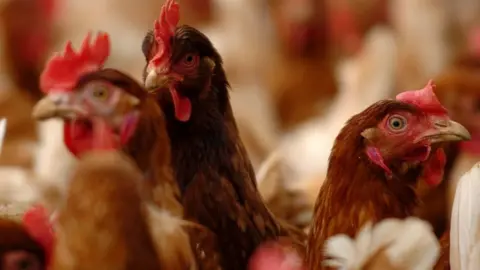Chickens culled after bird flu confirmed in Orkney
 PA
PAA flock of chickens from an Orkney farm has been culled in Scotland's first serious case of bird flu since 2016.
A six-mile (10km) control zone has been set up on the island of Sanday.
Thirty-nine free range laying chickens died of bird flu and the 11 remaining birds in the affected flock were put down.
The controls include restrictions on the movement of poultry, carcasses, eggs, used poultry litter and manure and restrictions on bird gatherings.
Scotland's Chief Veterinary Officer Sheila Voas said the risk to human health from the H5N8 Avian Influenza was very low.
Bird keepers have been urged to comply with an order to house birds that came in to effect on 14 December.
The last case of the H5N8 strain was found in a dead peregrine falcon in Dumfries and Galloway four years ago.
Other less serious strains of have been detected since then.
Ms Voas said: "We have already made clear that all bird keepers - whether major businesses or small keepers with just a few birds - must ensure that their biosecurity is up to scratch to protect their birds from disease and prevent any contact between their birds and wild birds.
Keepers who are concerned about the health or welfare of their flock should seek veterinary advice immediately. Your private vet, or your local Animal and Plant Health Agency office, will also be able to provide practical advice on keeping your birds safe from infection.
"Any dead wild swans, geese, ducks or gulls, falcons or other birds of prey or five or more dead wild birds of other species in the same location, should be reported to the Defra dead wild bird helpline."
She added that avian influenzas pose a very low food safety risk for UK consumers, and it does not affect the consumption of poultry products including eggs.


In theory, this strain could transmit to humans but as yet there have been no cases of it anywhere in the world.
However, it is highly infectious for birds and so restrictions for keepers have been put in place to lock their birds inside and away from wild birds.
This is more serious than the last case in 2016 when just a single wild peregrine falcon was infected. Clearly this time there has been transmission of the virus.
Free range poultry can continue to be labelled as such for a while but if this goes on for more than 12 weeks they will have to be relabelled and that will effectively devalue them.
It's an additional headache producers could do without just now with everything else that's going on.
But it is absolutely worth stressing that there's no risk at all from eating properly cooked poultry or eggs.

Because of the number of cases in Europe and in England the risk of bird flu is currently judged to be very high for wild birds, high for poultry where there is poor biosecurity and medium for poultry with protection measures in place.
A number of swans were recently found dead near the Hampshire coast and on the Isle of Wight and there were culls in Warwickshire and Worcestershire.
Earlier cases have included two farms in Norfolk, East Anglia and a wildlife centre in Gloucestershire. All 10,500 turkeys at a farm in North Yorkshire were culled following an outbreak.
Earliest opportunity
Rural Affairs Minister Mairi Gougeon said Scottish cases were not "unexpected" given the cases in wild and captive birds elsewhere in the UK.
"We ask that the public remain vigilant and report any findings of dead wild birds," she added.
NFU Scotland animal health policy manager Penny Middleton described it as "disappointing".
"It is now a legal requirement for all bird keepers, whether they have one hen in the back garden or a large poultry business, to keep their birds indoors and to follow strict biosecurity measures to limit the spread of Avian Influenza and keep out the disease", she said.
"It's crucial that everyone remains vigilant and reports any signs of disease - both in domestic birds and in wild birds - at the earliest opportunity."
